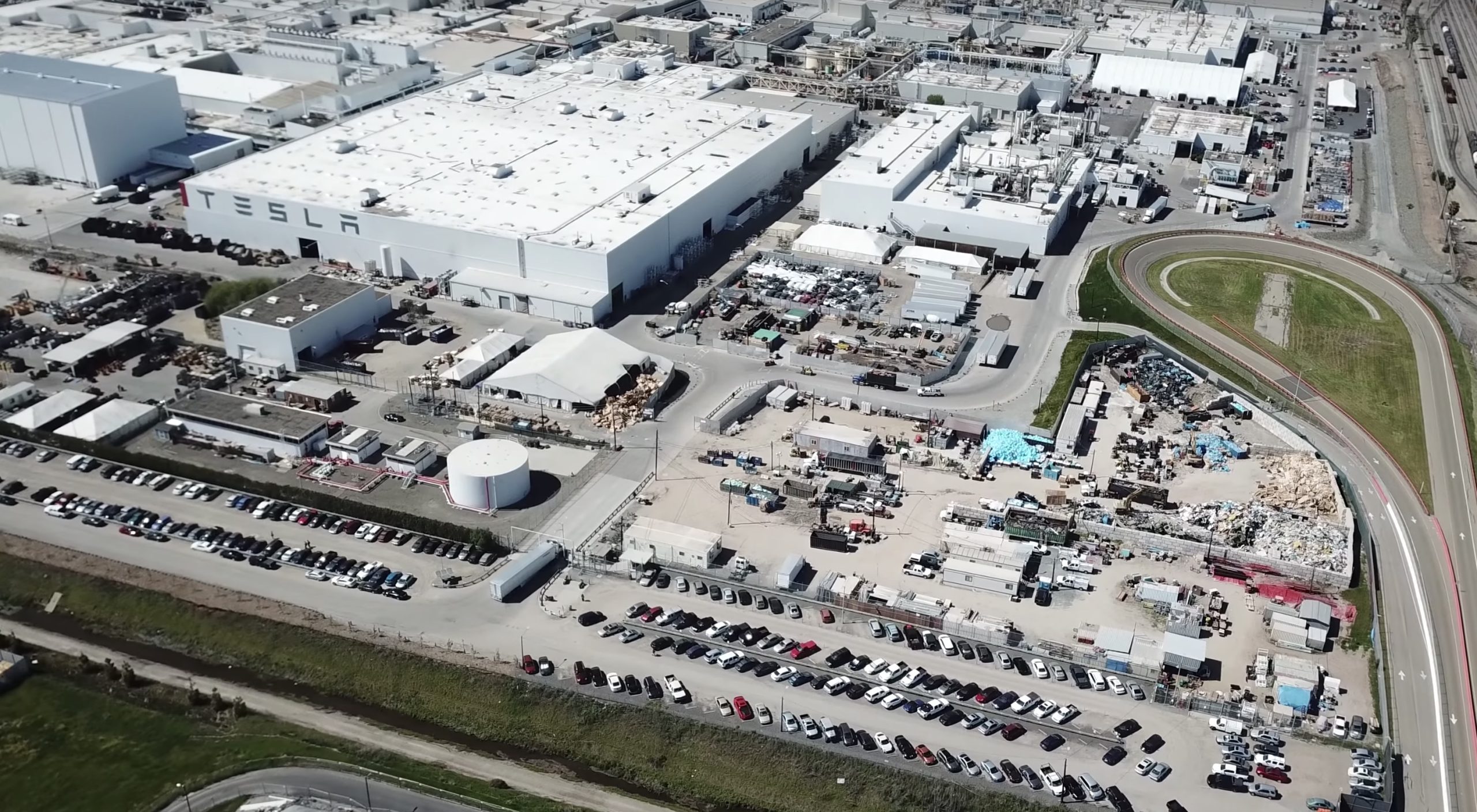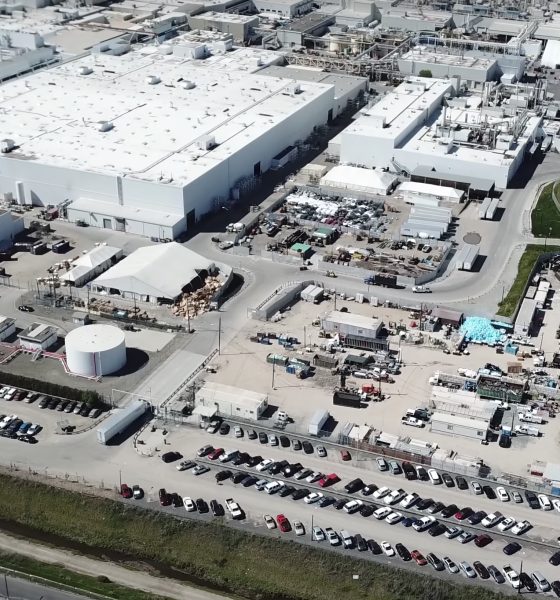

Investor's Corner
Tesla becomes 3rd most-shorted stock behind AMZN, AAPL as Q3 rush begins
Tesla (NASDAQ:TSLA) recently lost its place as the No.1 most shorted company in the US stock market, giving away the position to Amazon. Even more recently, Apple also overtook Tesla in the US market’s rankings for most-shorted companies, making the electric car maker as the 3rd most-shorted stock in the US market as of writing.
The updates to Tesla’s short interest was posted yesterday by S3 Partners LLC Managing Director of Predictive Analytics Ihor Dusaniwsky, who shared Tesla’s latest stats on Twitter. Dusaniwsky noted that Tesla’s short interest currently stands at $9.6 billion, which corresponds to 31.83 million shares, or 24.96% of the company’s float. The S3 Managing Director also noted that Tesla shorts are currently up $1.68 billion since Elon Musk announced his intentions to take the company private last month.
$TSLA short interest $9.60 bn, 31.83 mm shares short, 24.96% of float. Shs shorted down 2.9mm since The Tweet.#tesla is now only the 3rd largest U.S. short behind $AMZN & $AAPL. Shorts are up $404mm in MTM profits today,up $1.68 billion since The Tweet & down only $27 million YTD pic.twitter.com/coB9E3pTtb
— Ihor Dusaniwsky🇺🇦 (@ihors3) September 4, 2018
Tesla’s latest stats on its short interest shows what appears to be a slight yet consistent decline in the number of TSLA shares that are held short. Just last week, for example, the S3 Partners executive noted that Tesla’s short interest stood at $9.83 billion, which translates to around 32.43 million shares, or 25.43% of the company’s float.
Back in May, there were 39 million TSLA shares that were held short — the highest in Tesla’s history. That being said, as Tesla started to find its footing with the production of the Model 3, the number of Tesla shares that are held short have seen a steady decline, dropping to 34.9 million shares at the end of July. Even amidst the controversy surrounding Elon Musk’s attempt to take Tesla private in August, Tesla’s short interest seems to have continued its slight decline, falling to 32.7 million shares by the middle of the month.
Tesla is currently attempting to hit its Model 3 production targets for the third quarter. After hitting its then-elusive goal of producing 5,000 Model 3 per week at the end of Q2 2018, Tesla is now looking to sustain and ramp the manufacturing of the electric sedan. This is highlighted in the company’s production target of building 50,000-55,000 Model 3 in Q3 2018. As of Friday last week, reports have claimed that Tesla had produced more than 34,700 Model 3 in the quarter so far. That’s less than 16,000 vehicles away from the lower end of the company’s Q3 target for the Model 3.
The final months of Tesla’s quarters usually correspond to unorthodox measures that the company adopts to meet its self-imposed targets. Back in Q1 2018, Tesla’s goal was only to build 2,500 Model 3 in a week — a feat that was almost achieved after a seven-day blitz that saw the company manufacture just over 2,000 of the electric cars in one week. In Q2 2018, Tesla adopted even more radical strategies to hit its goal of producing 5,000 Model 3 per week. Some of these strategies involved building GA4, an entirely new assembly line set up at the grounds of the Fremont factory, as well as air-freighting robots and equipment from Europe to the United States to quickly address production bottlenecks in Gigafactory 1.
With these in mind, it would not be surprising if Tesla initiates an aggressive push for the Model 3 and its operations this September. With less than four weeks to go before the end of Q3, and with the company actively trying to become profitable this quarter, the coming days would likely be very compelling.
Disclosure: I have no ownership in shares of TSLA and have no plans to initiate any positions within 72 hours.

Elon Musk
Tesla stock gets latest synopsis from Jim Cramer: ‘It’s actually a robotics company’
“Turns out it’s actually a robotics and Cybercab company, and I want to buy, buy, buy. Yes, Tesla’s the paper that turned into scissors in one session,” Cramer said.

Tesla stock (NASDAQ: TSLA) got its latest synopsis from Wall Street analyst Jim Cramer, who finally realized something that many fans of the company have known all along: it’s not a car company. Instead, it’s a robotics company.
In a recent note that was released after Tesla reported Earnings in late January, Cramer seemed to recognize that the underwhelming financials and overall performance of the automotive division were not representative of the current state of affairs.
Instead, we’re seeing a company transition itself away from its early identity, essentially evolving like a caterpillar into a butterfly.
The narrative of the Earnings Call was simple: We’re not a car company, at least not from a birds-eye view. We’re an AI and Robotics company, and we are transitioning to this quicker than most people realize.
Tesla stock gets another analysis from Jim Cramer, and investors will like it
Tesla’s Q4 Earnings Call featured plenty of analysis from CEO Elon Musk and others, and some of the more minor details of the call were even indicative of a company that is moving toward AI instead of its cars. For example, the Model S and Model X will be no more after Q2, as Musk said that they serve relatively no purpose for the future.
Instead, Tesla is shifting its focus to the vehicles catered for autonomy and its Robotaxi and self-driving efforts.
Cramer recognizes this:
“…we got results from Tesla, which actually beat numbers, but nobody cares about the numbers here, as electric vehicles are the past. And according to CEO Elon Musk, the future of this company comes down to Cybercabs and humanoid robots. Stock fell more than 3% the next day. That may be because their capital expenditures budget was higher than expected, or maybe people wanted more details from the new businesses. At this point, I think Musk acolytes might be more excited about SpaceX, which is planning to come public later this year.”
He continued, highlighting the company’s true transition away from vehicles to its Cybercab, Optimus, and AI ambitions:
“I know it’s hard to believe how quickly this market can change its attitude. Last night, I heard a disastrous car company speak. Turns out it’s actually a robotics and Cybercab company, and I want to buy, buy, buy. Yes, Tesla’s the paper that turned into scissors in one session. I didn’t like it as a car company. Boy, I love it as a Cybercab and humanoid robot juggernaut. Call me a buyer and give me five robots while I’m at it.”
Cramer’s narrative seems to fit that of the most bullish Tesla investors. Anyone who is labeled a “permabull” has been echoing a similar sentiment over the past several years: Tesla is not a car company any longer.
Instead, the true focus is on the future and the potential that AI and Robotics bring to the company. It is truly difficult to put Tesla shares in the same group as companies like Ford, General Motors, and others.
Tesla shares are down less than half a percent at the time of publishing, trading at $423.69.
Elon Musk
Tesla to a $100T market cap? Elon Musk’s response may shock you

There are a lot of Tesla bulls out there who have astronomical expectations for the company, especially as its arm of reach has gone well past automotive and energy and entered artificial intelligence and robotics.
However, some of the most bullish Tesla investors believe the company could become worth $100 trillion, and CEO Elon Musk does not believe that number is completely out of the question, even if it sounds almost ridiculous.
To put that number into perspective, the top ten most valuable companies in the world — NVIDIA, Apple, Alphabet, Microsoft, Amazon, TSMC, Meta, Saudi Aramco, Broadcom, and Tesla — are worth roughly $26 trillion.
Will Tesla join the fold? Predicting a triple merger with SpaceX and xAI
Cathie Wood of ARK Invest believes the number is reasonable considering Tesla’s long-reaching industry ambitions:
“…in the world of AI, what do you have to have to win? You have to have proprietary data, and think about all the proprietary data he has, different kinds of proprietary data. Tesla, the language of the road; Neuralink, multiomics data; nobody else has that data. X, nobody else has that data either. I could see $100 trillion. I think it’s going to happen because of convergence. I think Tesla is the leading candidate [for $100 trillion] for the reason I just said.”
Musk said late last year that all of his companies seem to be “heading toward convergence,” and it’s started to come to fruition. Tesla invested in xAI, as revealed in its Q4 Earnings Shareholder Deck, and SpaceX recently acquired xAI, marking the first step in the potential for a massive umbrella of companies under Musk’s watch.
SpaceX officially acquires xAI, merging rockets with AI expertise
Now that it is happening, it seems Musk is even more enthusiastic about a massive valuation that would swell to nearly four-times the value of the top ten most valuable companies in the world currently, as he said on X, the idea of a $100 trillion valuation is “not impossible.”
It’s not impossible
— Elon Musk (@elonmusk) February 6, 2026
Tesla is not just a car company. With its many projects, including the launch of Robotaxi, the progress of the Optimus robot, and its AI ambitions, it has the potential to continue gaining value at an accelerating rate.
Musk’s comments show his confidence in Tesla’s numerous projects, especially as some begin to mature and some head toward their initial stages.
Elon Musk
Tesla director pay lawsuit sees lawyer fees slashed by $100 million
The ruling leaves the case’s underlying settlement intact while significantly reducing what the plaintiffs’ attorneys will receive.

The Delaware Supreme Court has cut more than $100 million from a legal fee award tied to a shareholder lawsuit challenging compensation paid to Tesla directors between 2017 and 2020.
The ruling leaves the case’s underlying settlement intact while significantly reducing what the plaintiffs’ attorneys will receive.
Delaware Supreme Court trims legal fees
As noted in a Bloomberg Law report, the case targeted pay granted to Tesla directors, including CEO Elon Musk, Oracle founder Larry Ellison, Kimbal Musk, and Rupert Murdoch. The Delaware Chancery Court had awarded $176 million to the plaintiffs. Tesla’s board must also return stock options and forego years worth of pay.
As per Chief Justice Collins J. Seitz Jr. in an opinion for the Delaware Supreme Court’s full five-member panel, however, the decision of the Delaware Chancery Court to award $176 million to a pension fund’s law firm “erred by including in its financial benefit analysis the intrinsic value” of options being returned by Tesla’s board.
The justices then reduced the fee award from $176 million to $70.9 million. “As we measure it, $71 million reflects a reasonable fee for counsel’s efforts and does not result in a windfall,” Chief Justice Seitz wrote.
Other settlement terms still intact
The Supreme Court upheld the settlement itself, which requires Tesla’s board to return stock and options valued at up to $735 million and to forgo three years of additional compensation worth about $184 million.
Tesla argued during oral arguments that a fee award closer to $70 million would be appropriate. Interestingly enough, back in October, Justice Karen L. Valihura noted that the $176 award was $60 million more than the Delaware judiciary’s budget from the previous year. This was quite interesting as the case was “settled midstream.”
The lawsuit was brought by a pension fund on behalf of Tesla shareholders and focused exclusively on director pay during the 2017–2020 period. The case is separate from other high-profile compensation disputes involving Elon Musk.








